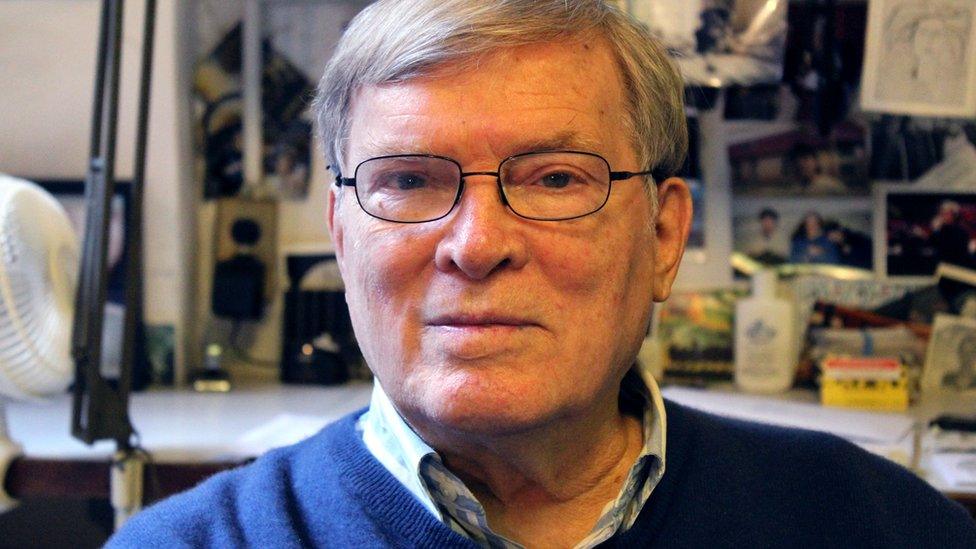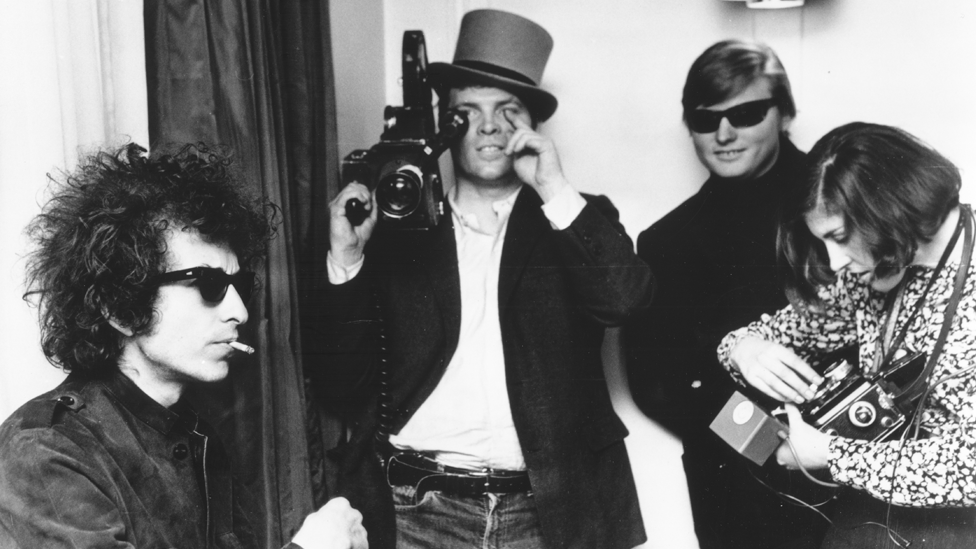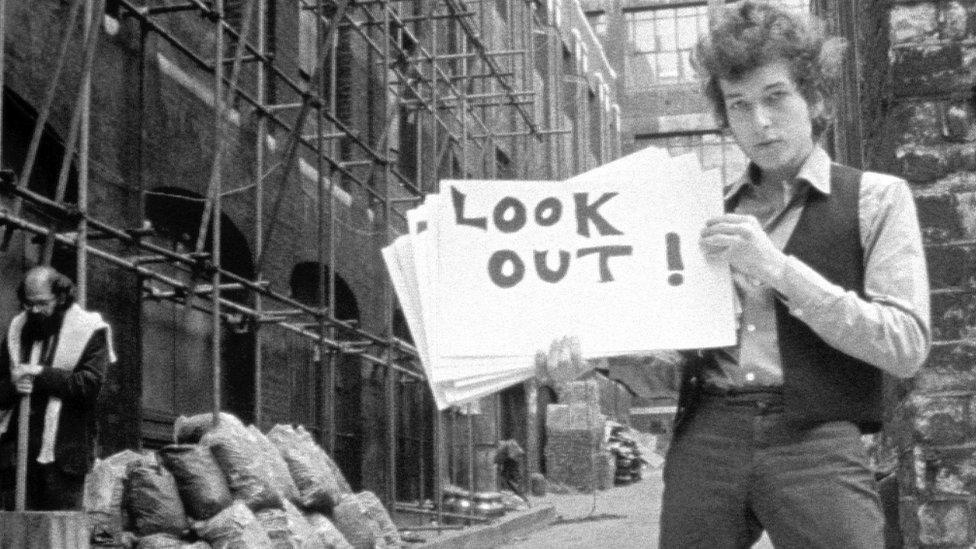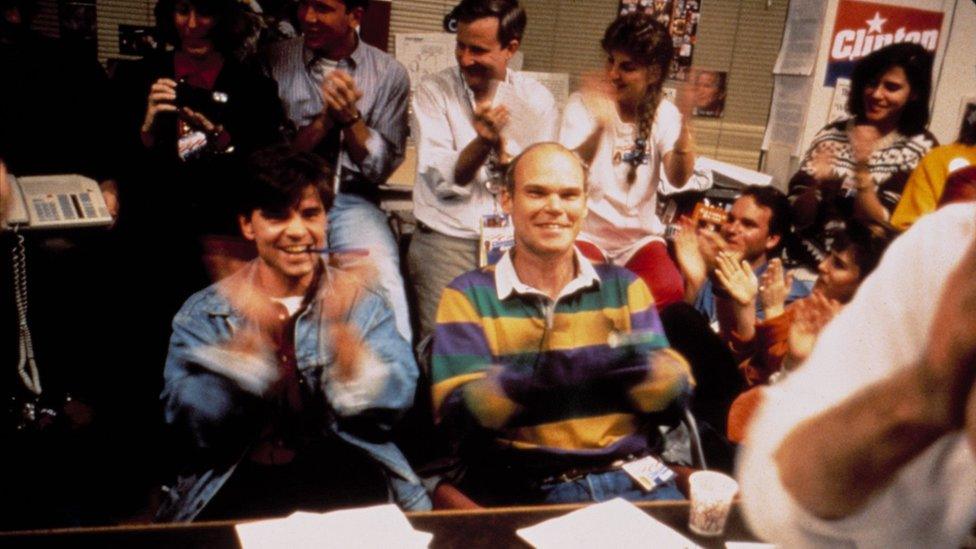Cult music film-maker DA Pennebaker dies, aged 94
- Published

DA Pennebaker invented a camera that allowed him to get closer to his subjects
Groundbreaking film-maker DA Pennebaker, who captured pivotal moments in the history of rock music and politics, has died aged 94.
He was best known for the Bob Dylan documentary Don't Look Back, and the 1973 film that captured David Bowie's final performance as Ziggy Stardust.
The War Room, his fly-on-the-wall look at Bill Clinton's 1992 presidential campaign, earned an Oscar nomination.
Pennebaker died on 1 August of natural causes, his family said.

DA Pennebaker (centre) filming Dylan (left) for Don't Look Back
The documentarian was born Donn Alan Pennebaker in Evanston, Illinois in July 1925; and learned camera technique from his father, a commercial photographer.
He served in the Navy during World War Two, then studied engineering at MIT and Yale. Upon graduation, he founded the company Electronics Engineering, which produced the world's first computerised airline reservation system.
After selling the company, Pennebaker directed his first film, the impressionistic short Daybreak Express, external (1953), which set the grimy elevated trains of New York City to the music of Duke Ellington.
Allow YouTube content?
This article contains content provided by Google YouTube. We ask for your permission before anything is loaded, as they may be using cookies and other technologies. You may want to read Google’s cookie policy, external and privacy policy, external before accepting. To view this content choose ‘accept and continue’.
In 1959, he co-founded Drew Associates, a collective that hoped to loosen up the dry, stale documentary format.
He was inspired by Robert Flaherty's 1922 film Nanook of the North, external; a silent movie which depicted the struggles of an Inuit hunter and his family in the Canadian Arctic.
"It was about this Eskimo, and Flaherty didn't try to tell you everything there was about the life of an Eskimo," said Pennebaker, external.
"He just wanted to show you what it was like to be with an Eskimo for little bit. And that's the feeling I tried to put across."
To make his ambition a reality, Pennebaker teamed up with British film-maker Richard Leacock to develop one of the first hand-held, synchronous-sound cameras - which allowed him to get closer to his subjects, capturing unguarded moments and snatches of conversation, dispensing with the need for overbearing narration.
"You wanted to drive the stories by what people said to each other," Pennebaker said, "not by what you thought up on a yellow pad."
Exposing Dylan
The first film to use the camera was Primary (1960) which followed John F Kennedy and Hubert Humphrey from dawn to midnight for five days, as they campaigned for the Democratic presidential nomination.
A short film on jazz vocalist David Lambert brought Pennebaker to the attention of Bob Dylan's manager, who invited Pennebaker to join the iconoclastic musician on his 1965 tour of England.
The resulting film, Don't Look Back, captures Dylan as he prepares to abandon his acoustic, folk-based sound for the electrified temptations of rock and roll.
The concert sequences are a knockout but Pennebaker doesn't eulogise his subject, showing him to be callow and vindictive, and providing a candid glimpse into his tortuous break-up with singer Joan Baez.

The opening sequence of Don't Look Back (with Allen Ginsberg in the background) is a precursor to the music video
Film critic Roger Ebert said Pennebaker's film "invented the rock documentary"; while the opening sequence, in which a young, scruffy Dylan holds up cue cards with the lyrics to Subterranean Homesick Blues served as a prototype for the modern music video.
Don't Look Back was a commercial and critical hit, and many of Pennebaker's subsequent films centred on musicians ("the very nature of film is musical," he once said).
Monterey Pop, from 1968, captured Janis Joplin, The Who, Otis Redding and Ravi Shankar at the previous year's Monterey International Pop Music Festival.
Using handheld 16mm cameras, Pennebaker thrust the audience right into the middle of the performances; watching with awestruck fascination as Jimi Hendrix laid his guitar on the stage and set it on fire.
"He was a flash of lightning on a dark rainy night, that's all I can tell you," Pennebaker told Best Classic Bands, external. "He lit up the sky. What he did was so seminal, so completely personally delivered, I think it's unique."
Allow YouTube content?
This article contains content provided by Google YouTube. We ask for your permission before anything is loaded, as they may be using cookies and other technologies. You may want to read Google’s cookie policy, external and privacy policy, external before accepting. To view this content choose ‘accept and continue’.
In 1973, he was invited to London to shoot David Bowie's final concert in the guise of alien rock star Ziggy Stardust. He had no idea who Bowie was - in fact, he initially thought he'd be filming Marc Bolan - but quickly fell under his spell.
"What I saw when David got on stage, was one person totally holding that stage for two hours," he later recalled. "I thought, 'There's not many people who can do that, I better get this all on film while it lasts.'"
His later musical films included the Depeche Mode road movie 101, the John Lennon concert film Live in Toronto '69, and Down From the Mountain, about the musicians who performed the songs in the Coen Brothers' film O Brother, Where Art Thou?
One of his most renowned works was Company: Original Cast Album, which documented the harrowing 18-hour recording session for Steven Sondheim's Broadway musical.
A scene in which Elaine Stritch strives and strives to record the perfect version of Ladies Who Lunch, external, as Sondheim holds his head in his hands in despair, is one of the most revealing portraits of creative frustration ever captured on film.
Pennebaker was not just interested in music, however, filming profiles of entrepreneur John DeLorean as he developed his ill-fated "car of the future" in Northern Ireland; and Saturday Night Live comedian Al Franken as he transformed into a political campaigner in 2004.

Laid-back communications director George Stephanopoulos and cantankerous strategist James Carville were the stars of The War Room
The War Room made stars of James Carville and George Stephanopoulos, key figures in Bill Clinton's presidential campaign, who helped steer the candidate through highs (the "read my lips: no new taxes," speech) and lows (the Gennifer Flowers scandal).
It also earned Pennebaker an Oscar nomination for best documentary feature in 1994. Nearly two decades later, he became the first documentarian to receive an honorary Oscar, recognising his pioneering contribution to cinéma vérité film-making.
The director characterised himself as a journalist for hire, and said his best work came when blended into the background.
"If you're setting up lights and tripods and you've got three assistants running around, people will want to get you out as fast as they can," he told Time magazine in 2007, external.
"But if you go the opposite way, if you make the camera the least important thing in the room, then it's different. I've left it on the floor.
"Sometimes, I'll shoot with it on my lap. Other times, I'll put it on a table and turn it on. You don't make it a big issue."
Pennebaker is survived by his third wife Chris Hegedus, with whom he worked on numerous films, including The War Room, and eight children.

Follow us on Facebook, or on Twitter @BBCNewsEnts. If you have a story suggestion email entertainment.news@bbc.co.uk.